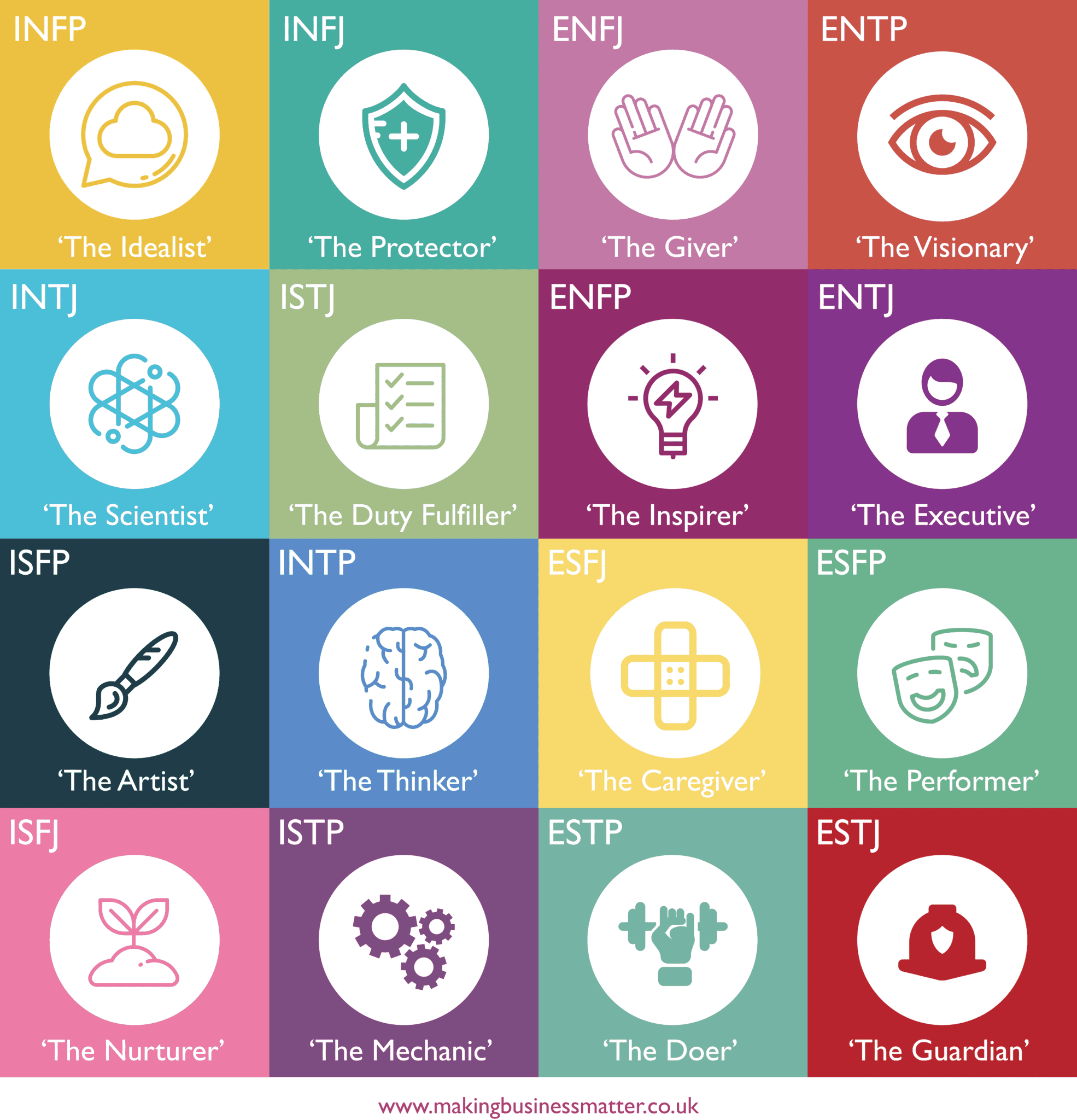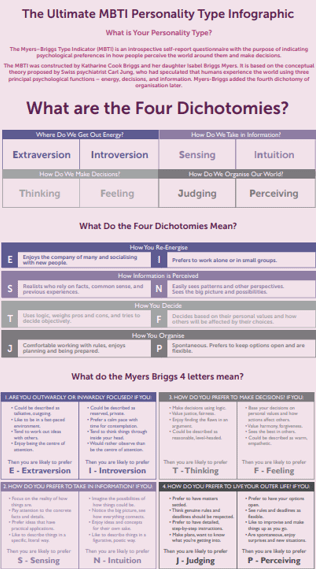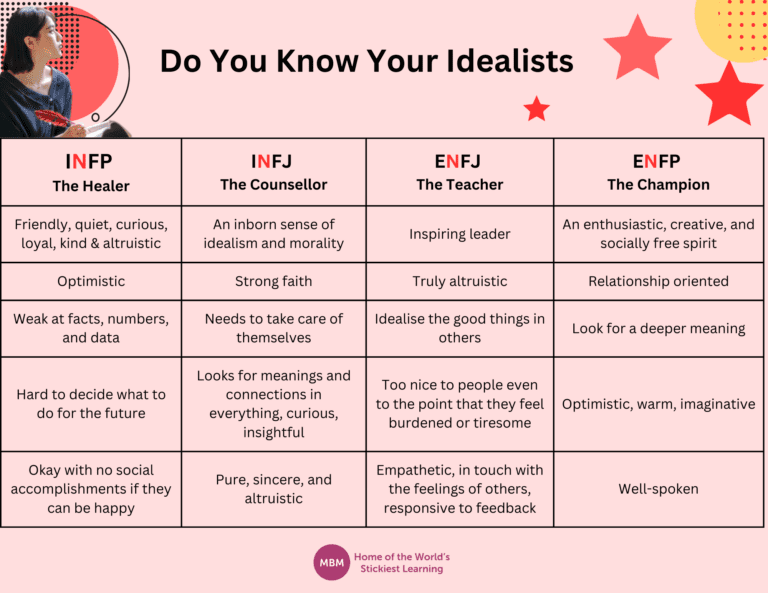‘The Idealist’
In this complete guide, you’re going to know everything you need to know about INFPs and their personality type to build a memorable relationship dynamic with them or rediscover yourself.
Both optimists and pessimists contribute to society. The optimist invents the airplane, the pessimist the parachute.”
– George Bernard Shaw
As 4% of the population and one of four idealists, INFPs are a rare breed of optimism. And might I add, much needed in those times?
So, the question is, how can you develop the strengths of INFP and become a better version of yourself? Well, that’s where this complete guide comes into play.
MBTI: An Overview
Carl Gustav Jung? Isabel Briggs-Myers? So, who’s the founder of MBTI? While many claim that Katherine Briggs and her daughter Isabelle Myers are the creators of the now-famous MBTI, did you know it was Carl Gustav Jung who came up with the idea first?
In fact, MBTI is based on Carl Jung’s work, “the influential theory of psychological types” dating back to 1921. His work talks about preferred types of behaviour with four main functions. The first two functions define the way we perform – how we take information and how we make decisions. Finally, the second two functions define our energy or form of expression – extraversion and introversion.
Controversially, and contrary to popular belief, Jung repeatedly objected to Katherine and Isabelle’s work, claiming that his work had been misinterpreted.

Development of MBTI
Strong with the belief that Jung’s theory on the knowledge of preferences will help women find work, Isabelle Myers with the help and guidance of her mother Katherine Briggs embarked on a journey that led to the birth of MBTI, also known as Myers Briggs Type Indicator.
One of the key advancements the mother and daughter added to the MBTI dimension is the attitude to the outer world and so the birth of a 4th preference came to light.
The Rise and Fame of MBTI
In 1970 Isabelle Myers and Mary McCaulley worked together to bring light to MBTI. Soon after, in 1975, their efforts paid off as it became one of the most used and well-known personality type assessments in the world (even until now).
Sticky Learning ® is 7 times more effective than 1-day training courses. Plus, you will get a Chain of Evidence proving your Return on Investment. Discover soft skills training that changes behaviours long term.

The 5 Values of MBTI
- MBTI can be used for individuals or teams.
- MBTI is a framework to improve self-awareness.
- MBTI is a powerful tool to improve communication.
- MBTI is a tool to develop leadership skills such as problem-solving, decision-making, change management, and teamwork.
- MBTI is a method for identifying stressors and how to manage them.
The 4 Dimensions of MBTI
So, let’s start our self-awareness journey with the 4 dimensions of MBTI. Here’s a quick checklist to gauge yourself and see where you stand. Reflect on those 4 questions without overthinking (we will cover more in-depth a little later, this is just to get you started).
1. First Dimension – how do you express your energy: are you an Extrovert (E) or an Introvert (I)?
2. Second Dimension – how do you process information: are you a Sensor (S) or an Intuitive (N)?
3. Third Dimension – how do you make decisions: are you a Thinker (T) or a Feeler (F)?
4. Fourth Dimension – how do you like your lifestyle: are you a Judger (J) or a Perceiver (P)?
Click on the below for the larger image.

So, now that you have reflected, you will notice that the different combination of those 4 dimensions results in 16 profiles which we know as MBTI. Those 16 profiles are divided into 4 different quadrants or families which we call: Rationales (INTJ, INTP, ENTJ, ENTP), Idealists (INFJ, INFP, ENFJ, ENFP), Guardians (ISTJ, ISFJ, ESTJ, ESFJ), and Artisans (ISFP, ISTP, ESFP, ESTP).
However, while we are born with a certain set of tendencies, we also develop subsequent tendencies as we grow up, due to our environment and the experiences we go through.
Example
For example, take someone born with a more dominant extroverted tendency; they can unconsciously develop their introverted tendency due to circumstances in life beyond their control (like an event that triggers shyness in them).
Other times, we can consciously choose to develop a tendency for work purposes. Someone who is a perceiver might want to develop some of the judger’s tendencies to be more productive at work.
Now, one thing for sure is that there is no black or white: extrovert or introvert, sensor or intuitive, thinker or feeler, judger, or perceiver. We all dance in a spectrum between each tendency. Some of us might have more extreme tendencies that’s for sure.
Remember, when we learn a new tendency, we don’t change our nature, we just upgrade ourselves thanks to our environment and upbringing.
However, maybe you are living in a constant state of stress, anxiety, and worry. Then, you are probably acting from nurtured tendencies rather than your natural tendencies. In that case, reverting to your natural tendencies can lower your stress. Here, once you master both dynamics, you can, of course, dance between them.
Okay, enough with MBTI. You want to know more about yourself, right? Just in case your curiosity is getting the better of you, check our ultimate MBTI guide (Myers Briggs). And if you want to confirm you are INFP, you can go through this short MBTI test.

>> Advanced Grow Coaching Cards <<
>> Shop on Amazon <<
Meaning of INFP
Actually, INFP types are special. In fact, they are already special. If you need confirmation, look at some of the names you’ve been called: the romantic hero/heroine, the compassionate healer, the panoramic perspective, the advocate at work, the truth seeker, and even the princess.
So, did you give up your ability to be special? Well, I sure hope not. Without a doubt, we need you in this world of doom and gloom.
Are you an Aquarius? Perhaps you enjoy freelance writing, marketing consulting, or even designing your own jewellery as a side hustle. Well, you are most probably an INFP. If you’re still on the fence and would like to be certain, here’s an additional list you might want to check.
Psychology Junky describes your complex nature and deep imagination as irresistible. There is even a hint of jealousy in their description, don’t you think so?

Are They Rare?
Now, the obvious question on everyone’s lips: Is INFP a rare personality type?
Previously, we mentioned earlier in this article that the INFP type makes up 4% of the population. However, is it enough to rank as the rarest personality? Well, not according to truity. In fact, INFP doesn’t rank among the top 5 rarest personality types (and career planner confirms it). And that is great news! You’re not alone on your island. Having an NF core, people and values are primordial and even vital for your well-being. However, don’t worry, you are still unique and special.
What About INFP Women?
Fun fact, INFP women make up 5% of all women. Apparently, the majority of INFP women are either business owners or stay-at-home moms. The latter has been a big trend as of late with side hustles, such as mum blogs, which generate considerable money online. And kudos to them!
So Who Are You Anyway?
As an INFP, you are an idealist, and you possess magnificent qualities most would be proud of. Among your most important qualities are your originality, desire, charitability, and self-expression.
So, what drives you forward and energises you:
- Searching for meaning,
- Exploring ideas and possibilities,
- Understanding the needs of others,
- Encouraging personal development.
INFP Personality Type Breakdown
Remember the 4 dimensions we briefly discussed earlier when describing MBTI? Well, here we are. I hope you were able to reflect, if not this is your chance.

1st Dimension: Introvert
So, let’s start with the first dimension. And the winner is (I) for “Introversion”! Netflix and popcorn anyone?
As an introvert, INFPs gain energy (and feel re-vitalised) by being with themselves – don’t misinterpret choosing to be alone as feeling lonely. Your preferred way of communication is by writing which allows you to work out ideas by reflecting on them. Also, you learn best by reflection and internal thinking.
Contrary to the extrovert (your opposite), quality always trumps quantity. As such, your focus tends to be in-depth when it comes to your interests. INFPs are also private and contained – they rarely share personal information and don’t pry on others. INFPs only take initiative if the situation is important to them, preferring the solace of their own company.
But, are you really an introvert? Or maybe, just maybe, an ambivert? One of the top organisational psychologists, Adam Grant, conducted studies that showed that 2/3 of the population are ambiverts. So to make sure you know who you really are, here’s a 9-item checklist you can check.
2nd Dimension: iNtuitive
Next, let’s welcome the second dimension. Here we answer the question: How do you process information?
INFPs are very intuitive. They excel at linking information, creating patterns, and focusing on the big picture and possibilities. Therefore, in their process of pattern creation, they notice anything new or different right away. Yes, they are that good.
The present doesn’t interest INFPs. Instead, they prefer a look at the future and what it entails. Empowered by a strong gut instinct, they like to figure things out for themselves, even if it takes more time than asking for help or guidance.
3rd Dimension: Feeling
Here, people and values are centre stage for INFPs. Some might call them subjective in their decision making but they don’t care, or rather they care too much. They always take into consideration people when making decisions. They are people pleasers who work best when there is harmony at work.
Actually, being people-driven, INFPs enjoy giving and receiving appreciation and finding common interests to share as well as common grounds to work on. Fair is their middle name and treating everyone equally is a must for them. Naturally, INFPs take into consideration the ideas and opinions of others before making a decision.
4th Dimension: Prospecting
Why be stuck in a 9 to 5 when you can work from your laptop from anywhere in the world? That could be an INFP motto. So, say no to tight deadlines, and no to strict schedules! Instead, leave me some room to breathe.
Yes, INFPs are perceivers and love it. They enjoy surprises and adapting to last-minute changes. Flexibility is key for their lifestyle, especially when it comes to plans. The most beautiful gift a perceiver can receive is the freedom to be spontaneous. Be careful though, they may run late for meetings.
Smart

Realistically, history has been very judgmental about intelligence; you’re only smart if you’re number smart or strategic (or something like that). Engineers and doctors are smart, the rest of the world needs to catch up. Let me tell you something, one of my favourite quotes was said by a certain Albert Einstein (yes ‘that’ Einstein):
Everybody is a genius. But if you judge a fish by its ability to climb a tree, it will live its whole life believing that it is stupid.”
Interesting right? Howard Garner, a Harvard psychologist, wrote a book in 1923 about 9 different types of intelligence. NINE! What does this mean for you? What type of intelligence do INFPs possess?
Intrapersonal Intelligence. Actually, you are a self-awareness genius. You know your strengths and weaknesses, and most importantly you have high emotional intelligence. And that, my dear, comes in super handy when you’re dealing with people.
INFP Weaknesses
Where do INFPs’ weaknesses come from? The gap between their ideal and reality. When INFPs fall, they fall hard. All the negativity and low energy of this world are hard to accept for INFPs. In fact, accepting defeat and being criticised by others takes a toll. I mean, INFPs already criticise themselves, a lot! That should be enough for five lifetimes. Wanting to stay in their bubble, INFPs don’t like to share, finding it hard to trust others.
To the extreme, INFPs can be impractical and run away from conflict.
INFP-t (the 5th Dimension)
T for Turbulent. Turbulent INFPs (INFP-t) are less assertive than Assertive INFPs (INFP-a). They tend to mince their words and bite their tongues before answering. On the other hand, they are better listeners than INFP-a. They are more likely to ask the opinions of their friends and partners. Also, INFP-ts are more likely to express their emotions. At work, an INFP-t is more of the idealist of the two and tends to work more. On the other hand, an INFP-a is easier going.
Key strengths include:
- Idealistic
- Emotionally expressive
- Sensitive to others.
What INFP-ts can improve on:
their feeling of being overwhelmed, being self-critical, and looking for validation from others.
How Does INFP Compare to the Other Three Idealists
Now that we know more about INFP, let’s see how other idealists are fair.
Click the image below for a larger version:

INFP vs. INFJ

So, how similar do you think INFPs and INFJs are? Take a moment to reflect before delving deeper.
Actually, while INFPs and INFJs have similar values and they share a strong core (NF), one letter separates them, and this letter makes all the difference. This one letter makes them think differently, which means they see the world differently. INFJs have an introverted intuition, while INFPs embody an introverted feeling. What does this mean?
The analytical side of INFJs shows up first while the spontaneous side of INFPs shows up first. While INFJs come up as very much in control externally, they can be a mess internally. Similarly, INFPs who come up as messy externally can be very organised and in control internally.
Now, when it comes to empathy, INFPs can separate their feelings from others, while INFJs take on other people’s emotions like a sponge.
And now, let the wedding bells start ringing!
Compatibility: INFP and Relationships
So, who should you marry? Actually, Idealists are most compatible with Rationales. In fact, as an Idealist, INFPs have the best flings and passionate short-term relationships with ENTJs. By comparison, they have the best long-term lovey-dovey relationship with INTJs.
As a rule of thumb, it’s important to have a balance of two traits in common and two complementary. The two in common will help you feel at home with the person, and the two complementary will give you the friction to keep the sparks alive. However, choosing the right combination to find your ‘almost’ ideal match will depend on your upbringing, your current environment (and if you want to change it), and the goals you want to achieve in life.
Taking the example above, the ENTJ will bring extraversion, a more objective way of looking at things, and a more routine life for you and into your relationship. While this combination is intriguing in the short term, it can exhaust you in the long haul.
Recently, an interesting research showcased how INFPs are a complex personality type when it comes to dating and relationships. Here, the study explored four different factors for compatibility:
- Communication
- Passion
- Friendship
- Partnership
This same study shows that whenever it ranked high in one, it ranked lower in another. So, what are you choosing? Or rather, whom are you choosing?
Now, let’s make you the best version of yourself. The next section will arm you with learning tools for you to grow and become your most magnificent self.
Learning & Growing
But first, a little glimpse into how you became you.

3 Stages of Development:
INFPs, just like any other personality type, go through three phases of transformation in their lifetime. Phases can be shorter or longer depending on your nature, the environment you are growing up and developing into, and your career.
#1: Childhood
Obviously, the first phase is childhood. As highly sensitive children, an INFP’s main development at this stage is their introversion. The outside world might seem like a shock for them (picture Clash of the Titans), pushing them to take refuge in their own company and develop their introverted activities.
#2: Teens to Early 30s
Next, the second phase happens between adolescence and early 30s. This is where INFPs develop the second faculty, intuition, and is at odds between the emotional teenage years and the maturity, thinking & feeling. Here, some extreme activities can occur now, such as joining the Marines or starting a music band. Evidently, the internal struggle can last a while.
#3: Integration
Then, the third and final phase of development for INFPs is the integration phase. This is where all the pieces of the puzzle click together.
How E & I Complement Each Other
Undeniably, Extroverts can help introverts open their sphere of influence by:
- Moving into action
- Broadening their ideas
- Amplifying their energy focus
- Expanding their interaction
- Widening their network
- Providing extensive information
In return, introverts can help extroverts centre themselves by:
- Reflecting more
- Scanning through ideas
- Deepen their calmness
- Strengthen their concentration
- Deepen their friendships
- Listening to others
How S & N Complement Each Other
Certainly, Sensors can help intuitivists be more practical by:
- Adding more facts
- Providing more practical and realistic information
- Looking deeper at the details
- Applying their experience when solving problems
- Focusing on what needs attention now
- Focusing on the present
In contrast, Intuitive can help Sensors recognise the inter-connectedness by:
- Looking at new ideas
- Creating change
- Being open to looking at trends
- Applying insight and pattern recognition to solving problems
- Focusing on long-term goals instead of short-term goals
- Focusing on future possibilities
How T & F Complement Each Other

Naturally, Thinkers can help Feelers get clearer and more direct by:
- Analysing the implications and consequences
- Being consistent with rules
- Standing firm on important principles
- Being more objective when making decisions
- Having specific criteria that allow a clearer thinking process
Alternatively, Feelers can help Thinkers reconnect by:
- Predicting how others will react and feel
- Making individual exceptions when necessary
- Accepting human-centred values
- Allowing better cooperation and collaboration
- Creating a more harmonious environment
How J & P Complement Each Other
Here, Judgers can help Perceivers be more productive by:
- Being more organised and decisive
- Sharing decisions and moving ahead
- Being in control
- Having closure
- Focusing on tasks and goals
- Providing clear expectations and timelines
On the other hand, Feelers can help Judgers be open to possibilities by:
- Being more flexible and adapting better
- Dealing with situations as they arise
- Embracing new experiences
- Being open to options
- Being open to new information
- Accepting change
Great points, right? Now, as an INFP, your opposite would be ESTJ. I’d like to invite you to choose one point of each of your opposite (that makes 4 points) and develop them, making them part of you.
How to Communicate with your INFP Manager, Colleague, or Romantic Partner
So, do you want to get the most out of your INFP colleague/employee/boss or even your romantic partner? It’s simple, just act as they would, and they will love you for it. So much so, that you will see their productivity skyrocket, their affection for you increases, and more.

The 6 INFP Rules for the Extrovert (rule 0: no open space)
First, practice active listening. Here, give time and attention to the ideas and thoughts of others.
Next, think before you speak. If you must speak, let them know you are thinking out loud.
Also, choose a time and place to communicate with a minimum of distraction.
Now, pause and wait for a response. So, don’t jump in to fill the silence, especially with small talk. Instead, allow for some silence and thinking time.
Next, don’t come across as imposing or demanding of an immediate response.
Finally, avoid making immediate decisions. In fact, give the decision-making process time to work its magic, even if it takes some time to get there.
Remember, the key to success is to take a bit more time before you speak or act.
The 6 INFP Rules for the Sensor (rule 0: dream a little, you are allowed)
- Provide a bird’s eye view, big picture, or overview before going into the facts and details.
- Don’t stay too long on facts and details. Instead, keep it concise and to the point.
- Share the main points and, if necessary, add some details. However, know what not to share.
- Show the potential of your ideas, and where they could lead. Remember, INFPs like to dream up possibilities.
- Don’t get stuck on facts. Instead, be open to changing what doesn’t work – have a leap of faith.
- Sharing is caring, so, give space for ideas and dreams (don’t be a party pooper)
Here, consider others and their input. Also, understand the importance of open, concise and complete communication.
The INFP Rules for the Thinker (rule 0: people buy emotions, not facts)
- Take the time to get to know INFPs and develop a rapport with them.
- When you are listening, avoid offering your thoughts at the same time.
- Remember to be friendly and offer support and encouragement.
- While honest feedback is important, remember to provide it gently and to critique the behaviour instead of the person. Here, acknowledge and don’t analyse feelings and values.
- While focusing on your tasks and objectives, remember that individuals are also involved in the situation – adding a personal touch would go a long way.
- Focus on creating a win-win situation, not everyone likes competition.
The 5 INFP Rules for the Judger (rule 0: “There is no shred of evidence that life is meant to be serious.” Unknown author)
To start, before making decisions, explore alternative opportunities.
Next, to make sure the project goes to completion, discuss and establish a timeline together with the INFP instead of just giving them a deadline – that way it looks as if the deadline is intrinsic rather than forced upon them.
Also, avoid making quick decisions and seek additional information before making a decision.
Now, try to be open to change – whether the situation, the dynamic, or even the plan.
Then, set your perfectionism aside and be willing to take a few steps even if your master plan is not ideal yet
What Stresses INFPs

The 5 stressors linked to their introversion:
- Working with others
- Talking on the phone a lot
- Interacting with others often
- Having to act quickly without reflection
- Too many concurrent tasks and demands
The 4 stressors linked to their feeling:
- Setting criteria and standards
- Criticism and concentration on flaws
- Focusing on tasks only
- Asking questions that seem inappropriate
So, are you up for a challenge? Here, I would like to invite you to work on one of the points mentioned so that you are in control of your stressor rather than them controlling you. And remember, “Rome was not built in a day.” Take it one bite at a time. And every time do one more small step.
Careers
Indeed, INFPs are sensitive idealists. They are motivated by deeper personal values. With that in mind, here are the ideal careers for an INFP:
- Massage therapist,
- Physical rehabilitation,
- Counsellor,
- Social worker,
- Psychologist/therapist,
- Academic roles,
- Author/writer,
- Graphic designer,
- HR development trainer.
So, as an INFP, would you fancy any of those roles? Alternatively, can you think of anyone who fills the above roles? Then, do their personality traits match the INFP qualities? For sure, you will see some if not many of the characteristics present.
As an NF, your main strength is seeing the potential for people’s development and growth. It’s all about people’s possibilities. You solve problems and make decisions using your NF functions (remember the 5 values and this will go a long way to know your INFP career path)
With N, you tune in to causes, generate alternatives, and seek patterns related to the problem. With F, you see where the decision fits with people and the values of the organisation and assess the effect on both, and then you determine how to win others to your solution.
Leadership
Importantly, an INFP doesn’t seek the spotlight, it’s the other way around. As an INFP, you are on a constant and never-ending path of personal and professional development for yourself and others. In fact, your vision of the potential for yourself and others is quite astounding. When you believe in something or someone, nothing will stop you from achieving it.
Empowered with your optimism, empathy, and vision, you are among the strongest leaders, and you tend to attract a special crowd of people. Here, your good listening skills, strong values, and open-minded approach are music to your followers who feel seen and valued.

You are the Merlin of King Arthur, and the Gandalf of King Aragorn. Your guidance creates heroes. And, between us, you are the real hero.
You only follow leaders you trust and respect, or else, it’s just a waste of time for everyone involved trying to convince you to lead.
Some INFPs might take their strengths to the extreme, which would turn them into their weakness. While it’s great to have a big vision, it’s also important to be practical. After all, we do live in a physical world. One way to overcome this challenge would be to surround yourself with a practical team that will do the nitty gritty.
A Challenge
Unfortunately, all personality types come with their own set of challenges. A common challenge that may arise with INFPs is their dislike of confrontation. In particular, when they must force their team to follow strict guidelines or schedules, this is prominent. INFPs consider this to be bossy (and rightly so!).
As a result, some consider INFPs to be weak leaders because of that. However, it’s in spite of that that they are truly the leaders we need. A leader is meant to expand not constrict, and is meant to inspire and not limit. Also, a leader is meant to show potential and not work in progress. Generals can enforce the rules, it’s what they do best.
Global Founders classified INFPs as visionaries and mentioned French President Emmanuel Macron and Saudi Prince Mohammed bin Salman.
Lifestyle
Naturally, INFPs enjoy different forms of art. In their downtime, you can spot an INFP drawing, dreaming, reading, learning a new language, listening to music, or even attending the theatre.
Famous INFP People

There are many famous INFPs out there, such as:
- William Shakespeare,
- Alicia Keys,
- Julia Roberts,
- Kobe Bryant,
- John Lennon,
- Helen Keller,
- Audrey Hepburn,
- Isabel Briggs.
Famous INFP-ts, to mention just a few:
- Kurt Cobain,
- Audrey Hepburn,
- Tim Burton,
- Nicolas Cage,
- Bob Marley,
- George Orwell.
Characters
Here, look at some of my favourite INFP characters:
- Frodo Baggins (Lord of the Rings),
- Anastasia (Anastasia),
- Raj Koothrappali (The Big Bang Theory),
- Cinderella,
- Lili Potter (Harry Potter),
- Rafiki (The Lion King),
- Merlin (Merlin).
Do you resonate with them? The personality database has a comprehensive INFP famous and fictional characters list for you to look at.
Action Plan

Now that you know yourself better, let’s help you step into the world, your new world, with an action plan. Let’s make sure that you are the best version of yourself.
We at Making Business Matter strongly support personal and professional growth. Additionally, as a manager, colleague, or partner working in the UK grocery industry as a supplier, we want to help you by giving you an action plan specially created for INFP supply managers working in the UK. In our free guide, you will learn about work-based activities, receive a roadmap for line managers to support their teams, and our 5-level evaluation (chain of evidence) to show the ROI of our training (they stick!).
So, stop everything you are doing and act now. Whether you are at work or home, ask the people you are surrounded by to do a small project with you for the next 10 minutes. And it can be anything, from designing a marketing campaign to cleaning a room. The key is to divide the team into two groups: extroverts and introverts. However, your goal is to observe, not participate. After you do the exercise, send us a Facebook message to receive feedback.
Conclusion
Remember, INFPs seek the Inner Ideal. Also, they seek Identity. All in all, they are caring supporters of people and ideas.
In summary, in this complete guide, you discovered MBTI in general, its purpose, and the value it brings to you personally and in the workplace. Also, you discovered the INFP meaning, your character type (INFP), the INFP personality type of your partner or INFP character of your colleague.
Now, you know that INFP mediators’ personalities and INFP idealists are two different breeds. You intimately know INFP: strengths, and weaknesses, how to communicate with an INFP to get the most out of the relationship, what stresses INFPs out, the ideal INFP compatibility, and what and how to develop to become the best version of yourself.
Finally, you found out about the 5th dimension (INFP-t and INFP-a), INFP famous people, took the INFP test, INFP careers, and the difference between INFP vs INFJ.
Updated: November 2023 by Ailish O’Rourke-Henriette




